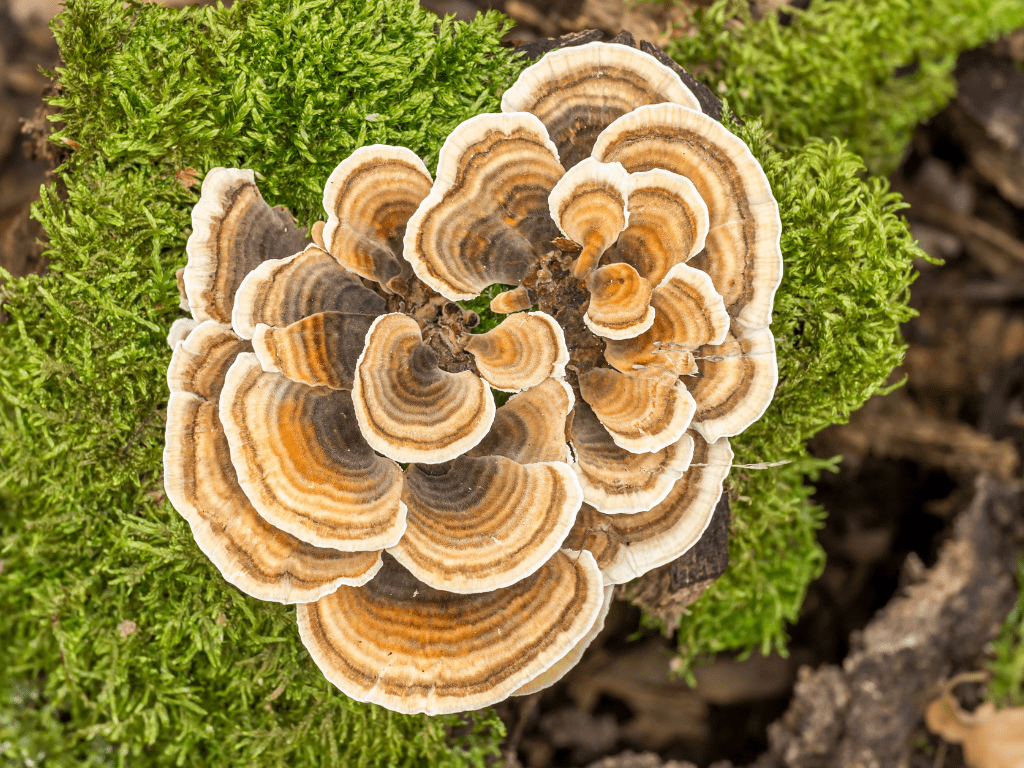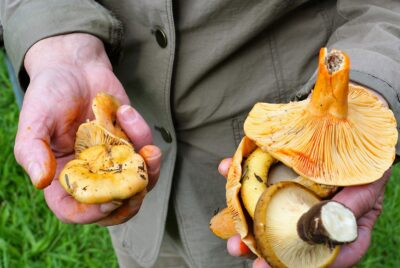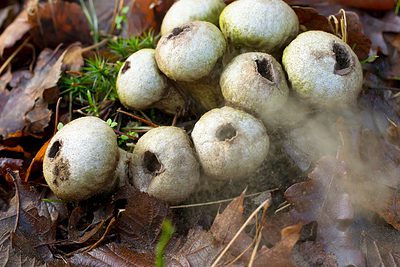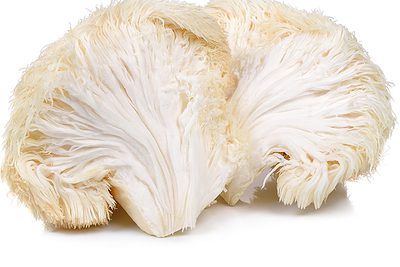The turkey tail mushroom is common in our forests, prolific around the world almost everywhere trees are found.
Its scientific name is Trametes versicolor, with other common names being Coriolus versicolor and Polyporus versicolor. It’s a common polypore, meaning it forms large fruiting bodies with pores or tubes on the underside. It’s also known as a bracket fungus because it forms thin structures in concentric circles and grows almost everywhere trees are found.
Versicolor is also a good description, since it means “of several colors” and the turkey tail does in fact have multiple colors. That along with its shape gives it the name turkey tail.
The turkey tail mushroom has a cap with concentric circles that are different colors. The outer margin is always the lightest color. It grows in layers, in groups or rows on logs and stumps of deciduous trees.
The Trametes versicolor has been used for centuries to treat various conditions, and science is now proving the health benefits of this fungus.
Like this pin? Pin it on Pinterest
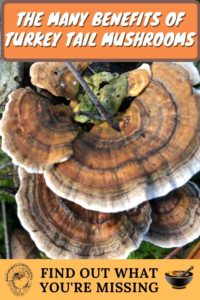
9 Health Benefits of The Turkey Tail Mushroom
What is turkey tail mushroom good for? There are many health benefits of the Trametes versicolor, now being confirmed by research.
Turkey tail’s health benefits are so well known as a boost to well being that the polysaccharide Krestin (PSK), is an approved drug paid for by national health care in Japan.
Turkey tail’s health benefits have been tested in clinical trials, including human clinical trials, showing a number of advantages it can provide for our well being. It’s also recommended to support other treatments for patients with chronic conditions.
Here are 9 health benefits of turkey tail mushrooms being displayed in research.
1. Anti-Tumor Properties
One study looked at the extracts of both the turkey tail mushroom and the maitake mushroom, and their effectiveness in treating colorectal cancer.
Citing the medicinal application of mushrooms in traditional eastern medicine, scientists took polysaccharide-rich extracts from both mushroom species. The study concluded that there is a potential antitumor effect of the extracts obtained from both types of mushrooms in human colon cancer cells.
They found that the extracts inhibited human colon cell proliferation and induced cytotoxicity (the quality of being toxic to cells.) They went on to say that they inhibited oncogenic potential, which is the process that causes development of a tumor; and inhibited cell migration and invasion in colon cancer cells.
2. Anti-Oxidant Properties
Scientists have been able to detect antioxidant activity in the turkey tail. One study concluded that Tramesan, a novel polysaccharide or glycan from Trametes versicolor, is a compound that can act as a “pro antioxidant” in different organisms, enhancing the natural antioxidant defenses.
Antioxidants are important to our health because they inhibit oxidation, a chemical reaction that can produce what’s known as free radicals. Those free radicals may damage cells, and in turn play a part in cancer, heart disease, stroke, and other diseases.
3. Anti-Bacterial Properties
Another study looked at the antibacterial activity of an extract obtained from the fruiting bodies of Coriolus versicolor. It found that the Coriolus versicolor expressed “bactericidal activity” against two types of bacteria.
The study concluded: “The growth curves of Staphylococcus aureus and Salmonella enterica serovar Enteritidis…showed that the obtained extract could inhibit the growth of tested bacteria.”
4. Supports Breast Cancer Treatment
The well-known mycologist Paul Stamets has written about the ability of the turkey tail mushroom, which grows worldwide in woodland environments, to stimulate immune function in women with breast cancer. He states that the primary mechanism of action of turkey tail mushrooms is immune modulation, in which immune responses are enhanced.
“This species of mushrooms has a history of use in Asia as a nonspecific immune modulator.”
He goes on to cite studies in which women were provided Trametes versicolor capsules consisting of activated, freeze-dried, organic mushroom mycelium, containing polysaccharides.
He states: “Perhaps the most intriguing part of this study was the finding that 6 g of Trametes versicolor appeared to lead to faster immune recovery after radiotherapy. This should be studied in additional clinical trials on the potential primary and secondary effects of mushroom therapy in patients with cancer.”
5. Provides Immune System Support
Besides studies specifically done on breast cancer patients, other studies have shown that the mushroom provides immune system support in general.
In one study, the mycelium was very potent in terms of triggering immune cell activation. But researchers were also able to conclude that “novel applications for animal and human immune health may be identified in the future for components isolated from fermented substrates, independent of mushroom mycelium.”
6. Supports Intestinal Health
The polysaccharopeptide from Trametes versicolor has prebiotic effects. This helps maintain intestinal health by providing “good” microbial flora in the intestine, supporting the intestine against disorders such as diarrhea, Clostridium difficile infection, and inflammatory bowel disease.
Prebiotics provide health benefits by adding beneficial effects to the intestine’s microbiome.
One study looked at the effect of the polysaccharopeptide from Trametes versicolor when used with the antibiotic amoxicillin, which can disrupt the microbiome and cause diarrhea and other side effects.
The study concluded that PSP from Trametes versicolor acts as a prebiotic to help “modulate human intestinal microbiome composition,” since recovery from the disruption caused by amoxicillin can take several weeks.
7. Help with Gastric Cancer Treatments
One article provides information on a review of a number of research studies into using polysaccharide K for patients with gastric cancers.
By looking at the results of 8,009 patients from eight randomized controlled trials, they found that immunochemotherapy along with polysaccharide K improves the survival of patients.
8. Other Pharmaceutical Applications
Studies have said that among all wild mushrooms, the Trametes versicolor mushrooms have gained popularity due to broad spectrum utilization in both food and pharmaceutical industries.
For instance, one study showed that the mushroom’s extract had effective antimicrobial and anti-inflammatory activity.
Researchers concluded that it could be used as an active ingredient for the preparation of antimicrobial hand sanitizer and anti-inflammatory drugs.
9. Support for Diabetes
While not conducted on human patients, one study looked at patients with type 2 diabetes, who usually have poor immunity and more often suffer from cancer and microbial infections.
It found that Coriolus versicolor extract significantly reduced blood glucose levels of rats, and increased glucose consumption in insulin resistant cells. The extract treatments also resulted in “remarkable anti-insulin-resistance effects.”
Turkey Tail’s Benefits for Cancer
As mentioned, turkey tail has been studied and found to be beneficial when added to the treatment regimen of several different cancers.
One study brought that information together, looking at the effectiveness of Coriolus versicolor on survival in cancer patients.
It concluded that it resulted in a “significant survival advantage compared with standard conventional anti-cancer treatment alone.”
Here are the results:
- A 9% absolute reduction in 5-year mortality, resulting in one additional patient alive for every 11 patients treated.
- In patients with breast cancer, gastric cancer, or colorectal cancer treated with chemotherapy, the effects of the combination of Coriolus versicolor preparation on the overall 5-year survival rate was more evident.
In conclusion, researchers found strong evidence that Coriolus versicolor would have survival benefit in cancer patients, particularly in carcinoma of breast, gastric and colorectal.
Turkey Tail Dosage and Side Effects
Those looking to access the benefits of this mushroom often ask: Is Turkey tail mushroom psychedelic? There is no evidence to prove that as they actually do not contain any psilocybin.
As for the dosage of the turkey tail, those who are taking it as a supplement to cancer therapy will receive specific instructions and dosages of the extract. The side effects for that type of treatment can sometimes be diarrhea or darkened stools. It is also reported that the turkey tail glucan products “have been safely consumed at doses of 1 g or more per day for up to 10 years in cancer patients.”
Can you eat turkey tail mushroom? Yes. In regular consumption of turkey tail, some people may experience digestive symptoms like gas or bloating, typical of other types of mushrooms.
In terms of dosage for those consuming it on a regular basis and not as part of a treatment regimen, treat it as you would any mushroom. It’s best to start with a small amount to let your system adjust to it.
If you find it in the wild, be sure you confirm that it is in fact turkey tail before you eat it. There are imposters that look similar, like the false turkey tail and the multicolor gill polypore.
Once you know you’ve got the right kind, you may be asking, what does turkey tail mushrooms taste like? It’s not ideal to be eaten raw, because it can be tough and chewy. It can be cooked, or it can be dried and turned into powder.
Turkey tail is also available in supplements that are easy to add to your daily routine, including in powder, extract or capsule form. Powders, for instance, are great to add to smoothies, where you can get the health benefits without eating them – ideal for those who don’t like the taste or texture of mushrooms.
Cooking with Turkey Tail Mushrooms, and a Recipe
Some describe the flavor of turkey tail as being more pungent than other types of medicinal mushrooms. If you’d like to try it, chop it and mix it into a recipe like a stir-fry, as you would other types of mushrooms.
It’s also ideal used to make a broth, and we’ve even got an easy recipe for you to try. A soup can give you an easy boost to your well-being. Or, as we’ve mentioned, you can take it as a supplement in powder, extract or capsule form.
Final Thoughts
Its versatile color gives the turkey tail mushroom its scientific name Trametes versicolor or Coriolus versicolor.
It also provides many versatile health benefits, from anti-oxidant to anti-tumor to anti-bacterial properties, along with support for cancer treatments.
These many positive properties of the turkey tail make it worth adding to your diet, whether cooked into soup, or eaten as a supplement.
Sources:
https://www.ncbi.nlm.nih.gov/pmc/articles/PMC4890100/
https://www.ncbi.nlm.nih.gov/pmc/articles/PMC7447717/
https://www.ncbi.nlm.nih.gov/pmc/articles/PMC6889544/
https://www.ncbi.nlm.nih.gov/pmc/articles/PMC6367522/
https://www.cancer.gov/publications/dictionaries/cancer-terms/def/antioxidant
https://www.ncbi.nlm.nih.gov/pmc/articles/PMC5567496/
https://www.nationalgeographic.com/animals/birds/facts/wild-turkey
https://en.wikipedia.org/wiki/Trametes_versicolor
https://en.wikipedia.org/wiki/Polypore
https://www.healthline.com/nutrition/turkey-tail-mushroom
https://pubmed.ncbi.nlm.nih.gov/25006989/
https://pubmed.ncbi.nlm.nih.gov/22185453/
https://www.ncbi.nlm.nih.gov/pmc/articles/PMC3369477/
https://pubmed.ncbi.nlm.nih.gov/17106715/

